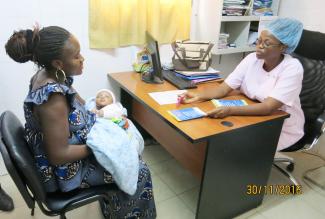At the end of 2011, Côte d’Ivoire was emerging from a decade of economic and political instability marked by two civil wars. The country faced significant health challenges, particularly in the area of maternal and child health, and was struggling to prevent and treat HIV, tuberculosis (TB), and malaria. Prolonged conflict led to poor governance and under-funding, both of which weakened the public health sector.
In response to these challenges, the Government of Côte d’Ivoire, in its National Health Development Plan for 2012–2015, articulated a vision for an integrated, accountable, efficient health care system that would guarantee the health and well-being of all citizens, particularly the most vulnerable populations. To accomplish its vision, the government prioritized strong leadership, transparent governance, and sound management.
To support the government’s efforts to strengthen its health system, the U.S. President’s Emergency Plan for AIDS Relief (PEPFAR) prioritized leadership, management, and governance activities.
In December 2011, through the USAID Leadership, Management and Governance (LMG) Project, PEPFAR began financing activities to build the capacity of members of the Country Coordinating Mechanism (CCM)—a national committee of representatives from government, the private sector, technical fields, and civil society—and recipients of grants from Global Fund to Fight AIDS, Tuberculosis and Malaria (GFATM) to improve governance, monitoring, and oversight of these grants. These activities built on previous capacity building assistance provided to the CCM from 2005–2010 through the USAID Leadership, Management, and Sustainability (LMS) program. By continuing to help strengthen these entities, LMG/Côte d’Ivoire helped create more stable, transparent, and efficient national structures capable of obtaining and managing increased levels of funding from the GFATM. In 2013, LMG/Côte d’Ivoire expanded to provide technical assistance to the regional and district levels of the health system. Responding to the challenges of a centralized health system characterized by top-down decision-making and inefficient bureaucracy, the Ministère de la Sante et de l’Hygiène Publique (MSHP) decentralized decision-making and management to health regions and districts, bringing important health decisions closer to the communities and people they serve. To support this shift, LMG/Côte d’Ivoire began implementing a decentralized management pilot project in the health regions of Indénié-Djuablin and N’ZiIffou-Moronou. LMG/Côte d’Ivoire worked directly with the managers and directors at the decentralized levels in those regions, focusing efforts on producing measureable results rather than completing routine activities. LMG’s strategy was to build the leadership and management capacity of decisionmakers through specialized training and mentoring. By December 2014, the regions and corresponding districts of implementation showed marked improvements in HIV and AIDS and maternal and child health (MNCH) indicators. For example, the antiretroviral therapy (ART) retention rate of people living with HIV increased by about 40% in both regions. In 2014, the already weak health systems in the West Africa region were hit by the Ebola outbreak. Sharing borders with two of the three countries hit hardest by the epidemic, Liberia and Guinea, Côte d’Ivoire’s already fragile health infrastructure faced a major threat. In response to this acute challenge, USAID allocated Ebola emergency funds in 2015 to extend the LMG decentralization project to three new regions along the border with Guinea and Liberia (Cavally,Guémon, Kabadougou-Bafing-Folon, and Tonkpi). LMG focused on building cross-sectoral capacity at the regional, district, and hospital level for epidemic preparedness and response. Over the course of two years, LMG strengthened the epidemic surveillance system in these regions. By the end of activities in June 2017, the regions and their corresponding districts and referral hospitals were better equipped to respond to epidemic threats. In one district, the weekly notification rate (from health sites to the district) on possible cases of Ebola, yellow fever, cholera, measles, and meningitis increased from 15% to 100%. In one referral hospital, the percentage of suspected cases of epidemic diseases reported in the national notification system increased from 26% to 100%. At its end in June 2017, LMG/Côte d’Ivoire had trained over 400 practitioners in leadership, management, and governance (L.M.G) practices at the hospital, district, regional, and central levels of the health system. The MSHP worked in close partnership with MSH throughout the project. In 2016, after seeing LMG’s results, the MSHP took ownership of the LMG decentralization approach and expanded the program to three additional regions (Bélier, Agnéby-Tiassa-Mé, and Sud-Comoé) with funding from the GFATM malaria and TB grants.

USAID
